Protein Glycosylation Labeling Service
Protein glycosylation plays a critical role in modulating protein stability, folding, and biological activity. Accurate labeling and characterization of glycosylation patterns are essential for understanding protein function, developing biopharmaceuticals, and ensuring quality control in drug production. As a leading biotechnology services provider, Creative BioMart delivers comprehensive Protein Glycosylation Labeling Solutions powered by state-of-the-art technologies, including mAb-Glyco Chip, LC/MS, advanced liquid chromatography systems, and electrophoresis. Our services cover glycan annotation, glycoprotein enrichment, glycan staining, and glycoproteome analysis, ensuring precise, reproducible, and reliable results tailored to your research and development needs.
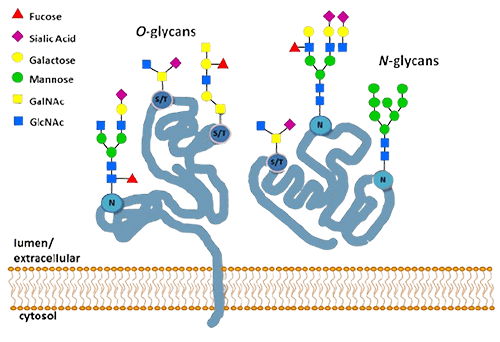
Glycosylation: Biological Functions and Clinical Implications
Protein glycosylation is one of the most common and functionally significant post-translational modifications, influencing protein structure, recognition, and function. Aberrant glycosylation patterns are closely associated with various diseases, including cancer, autoimmune disorders, and infectious diseases, making glycosylation analysis vital for both basic research and therapeutic development. Traditional methods often face challenges in resolution and reproducibility, but modern analytical technologies now allow highly accurate profiling and labeling of glycoproteins. Creative BioMart combines cutting-edge analytical tools with expert scientific support to help researchers unravel the complexities of protein glycosylation.
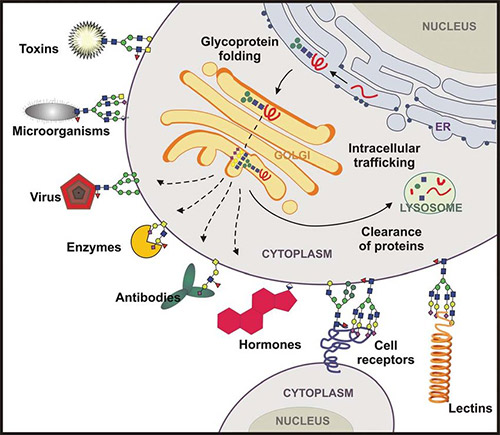
Figure 1. Glycans participate in multiple mechanisms of cellular regulation. (Defaus et al., 2014)
Protein Glycosylation Labeling Services & Capabilities
Our Protein Glycosylation Labeling Services include:
-
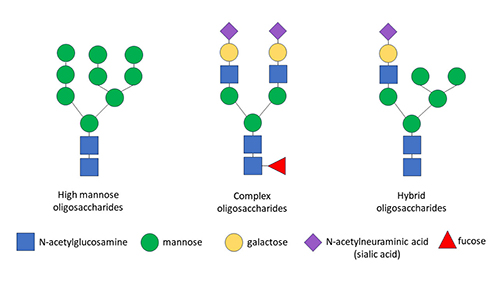
Annotation of Glycosylation Types
N-linked, O-linked, and C-linked glycosylation, as well as glycation.
-
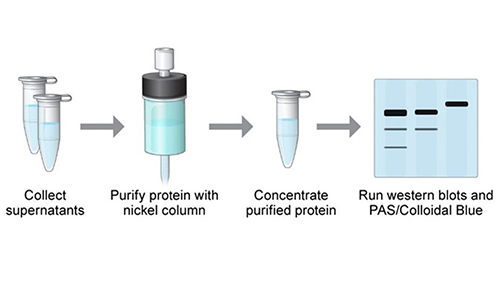
Glycan Staining and Labeling
With high sensitivity and specificity.
-
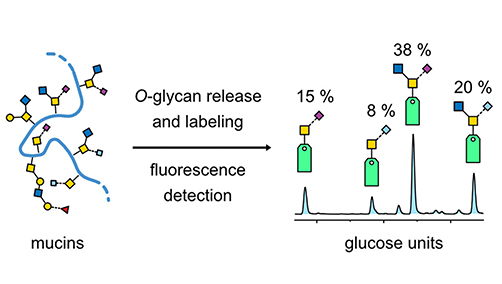
Glycoprotein Purification and Enrichment
Using advanced chromatography and lectin-based methods.
-
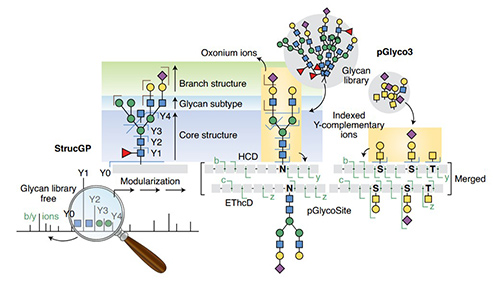
Comprehensive Glycoproteome and Glycome Analysis
By mass spectrometry.
Our Special Lectin Service
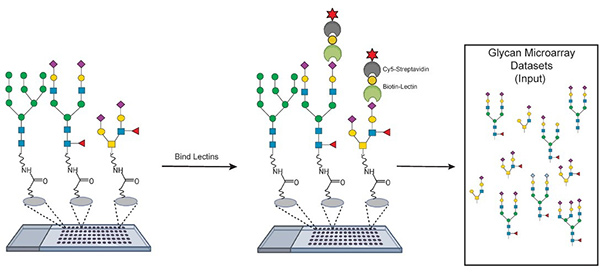
Figure 2. Lectin microarrays for glycoprotein analysis. (Adapted from Bojar et al., 2022)
Lectins are glycan-binding proteins with exceptional specificity for distinct sugar moieties, making them powerful tools for detecting and analyzing glycoprotein functions. At Creative BioMart, we harness the versatility of lectins by conjugating them to probes such as horseradish peroxidase (HRP), fluorophores, and biotin. Additionally, lectins can be immobilized onto solid supports such as streptavidin and NeutrAvidin proteins for highly efficient capture and detection applications.
Our lectin-based services include:
- Glycoprotein identification for research and therapeutic applications.
- Glycoprotein purification and enrichment via lectin affinity methods.
- Characterization of cell surface glycoconjugates to study signaling pathways and disease markers.
- Glycosylation mutant generation to explore the functional impact of glycan modifications.
- Glycosyltransferase (Gtf) and glycosidase activity analysis to support mechanistic and enzymatic studies.
These services provide powerful, customizable solutions for studying glycoproteins in both complex biological systems and purified protein samples.
Service Workflow

Our Advantages in Protein Glycosylation Labeling
- Cutting-edge Technology: Integration of LC/MS, glycochip, chromatography, and electrophoresis ensures robust results.
- Expert Scientific Support: Our team provides guidance from experimental design to data interpretation.
- Comprehensive Service Portfolio: Covering glycan annotation, labeling, purification, and functional analysis.
- High Sensitivity and Specificity: Reliable detection of subtle glycosylation changes.
- Customizable Solutions: Tailored workflows designed to fit unique project requirements.
- Proven Track Record: Successful completion of numerous protein glycosylation projects across academic and industrial clients.
Case Studies: Applications of Protein Glycosylation Labeling
Case 1: Lectin-based characterization of vascular cell microparticle glycocalyx
Scruggs et al., 2015. doi:10.1371/journal.pone.0135533
Microparticles (MPs), released both constitutively and upon cellular activation, play important roles in vascular homeostasis, injury, and biomarker discovery. While the glycocalyx of intact cells is often used to identify cell types, little is known about the glycocalyx of MPs. To investigate this, MPs from rat pulmonary microvascular and arterial endothelial cells, pulmonary smooth muscle cells, and aortic endothelial cells were analyzed under healthy and cigarette smoke–induced injury conditions using a lectin panel. Surprisingly, MPs did not display the same glycocalyx as their parental cells, nor did they exhibit type-specific signatures, suggesting a distinct glycocalyx composition.
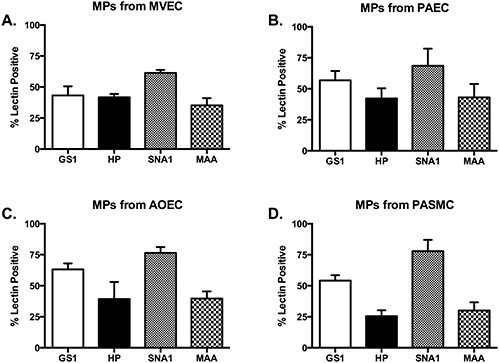
Figure 3. Glycocalyx of MPs from cigarette smoke extract injured vascular cells. (Scruggs et al., 2015)
Case 2: Mannose receptor binding and its impact on mab development
Baumeister et al., 2024. doi:10.1080/19420862.2024.2400414
During therapeutic monoclonal antibody (mAb) development, controlling N-glycosylation is essential since high-mannose glycans can accelerate clearance and reduce half-life. Factors such as cell lines, process conditions, and media influence high-mannose content, which can occur as asymmetrical or symmetrical glyco-pairs. Although the mannose receptor (MR, CD206) has long been suspected to mediate rapid clearance by internalizing high-mannose mAbs, direct evidence was lacking. This study systematically demonstrated MR binding to the Fc region using novel methods—MR surface plasmon resonance and MR affinity chromatography. Results showed binding depends on high-mannose content and is strongest with symmetrical glyco-pairs, advancing understanding of MR-mAb interactions.
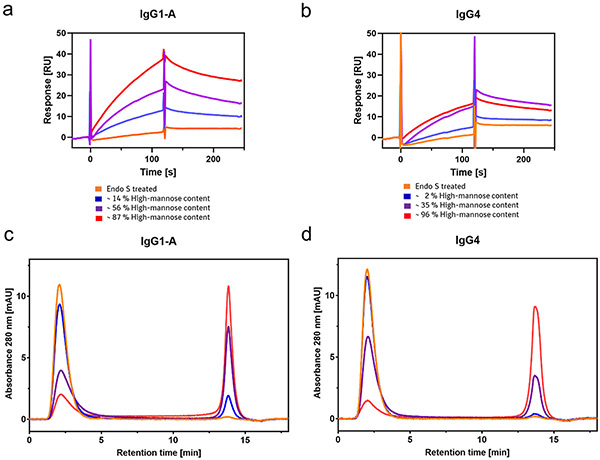
Figure 4. Interaction of IgG1-A (a, c) and IgG4 (b, d) with the MR analyzed by MR-SPR. Different high-mannose variants of each mAb are compared to the Endo S treated control, reflecting a deglycosylated mAb. (Baumeister et al., 2024)
Customer Experiences with Our Glycosylation Services
"Creative BioMart’s protein glycosylation labeling service was instrumental in our biosimilar development program. Their team annotated N- and O-linked glycosylation on our therapeutic antibody using LC/MS and glycochip technology. The data revealed subtle glycan variants that had gone undetected in our internal assays, allowing us to fine-tune our cell culture process. Their precise reporting not only accelerated comparability studies but also gave our regulatory group confidence in filing with health authorities."
— Senior Director of Analytical Development | Mid-Sized Biopharma Company
"We engaged Creative BioMart to characterize cell surface glycoconjugates in our oncology biomarker discovery project. Using lectin-based enrichment and fluorescence labeling, they identified distinct glycosylation signatures associated with metastatic progression. The results provided us with a set of validated glycan markers that are now part of our early-stage diagnostic platform. Their responsiveness and ability to integrate custom requests exceeded our expectations."
— Head of Translational Research | Cancer Research Institute
"Our vaccine development program required detailed glycosylation profiling of a recombinant glycoprotein antigen. Creative BioMart delivered a comprehensive glycome analysis that mapped glycosylation sites, confirmed glycan heterogeneity, and quantified occupancy. This information was critical for correlating glycan profiles with immunogenicity. Their workflow was efficient, and the technical team provided invaluable guidance on assay selection and data interpretation."
— Principal Scientist, Vaccine Development | Global Pharmaceutical Company
"We partnered with Creative BioMart to generate glycosylation-deficient mutants for an enzyme engineering project. Their expertise in mutant generation and glycosidase activity assays allowed us to pinpoint the role of specific glycans in catalytic efficiency. The deliverables were robust, reproducible, and arrived ahead of schedule. Their collaborative approach made them feel like an extension of our internal R&D team."
— Director of Protein Engineering | Biotechnology Startup
FAQs About Protein Glycosylation Labeling Service
-
Q: What types of glycosylation can you annotate and analyze?
A: We provide comprehensive annotation services for N-linked, O-linked, and C-linked glycosylation, as well as glycation. Each analysis is performed using advanced LC/MS, glycochip technology, and chromatography systems to ensure high sensitivity and precision. -
Q: Can you help with functional studies of glycoproteins, not just profiling?
A: Yes. Beyond glycan profiling, we also support functional investigations. Using lectin-based approaches, we can characterize cell surface glycoconjugates, perform glycoprotein enrichment, generate glycosylation mutants, and conduct glycosyltransferase (Gtf) and glycosidase activity assays. -
Q: How do you ensure the accuracy and reproducibility of your results?
A: We combine state-of-the-art technologies (mAb-Glyco Chip, LC/MS, liquid chromatography, and electrophoresis) with strict quality control procedures. Every workflow is designed for high reproducibility, and results are delivered with clear documentation and expert interpretation. -
Q: Do you offer customized workflows for unique research projects?
A: Absolutely. Our service is highly flexible and customizable. We begin with a consultation to understand your research goals and design a workflow that fits your specific requirements—whether it’s glycoproteome analysis, biomarker discovery, or therapeutic development. -
Q: How does your lectin service add value compared to standard glycosylation analysis?
A: Lectins offer high specificity for distinct sugar moieties, enabling sensitive detection of glycoproteins. By conjugating lectins to probes such as horseradish peroxidase, fluorophores, or biotin—and immobilizing them on solid supports—we deliver powerful enrichment, detection, and functional analysis capabilities that standard profiling alone cannot achieve.
Resources
Related Services
- Pharmaceutical Stability Analysis
- Protein Sequence Analysis and Function Prediction
- Biopharmaceutical Solution
- Quality Control
- Membrane Proteins Expression and Purification
- Universal UDP-Glycosyltransferase Assay
- Protein Labeling
- Fluorescent Labeling in Vitro
- Site-Specific and Custom Labeling
- Biomarker Service
References:
- Baumeister J, Meudt M, Ebert S, et al. Decoding the mannose receptor-mAb interaction: the importance of high-mannose N-glycans and glycan-pairing. mAbs. 2024;16(1):2400414. doi:10.1080/19420862.2024.2400414
- Bojar D, Meche L, Meng G, et al. A useful guide to lectin binding: machine-learning directed annotation of 57 unique lectin specificities. ACS Chem Biol. 2022;17(11):2993-3012. doi:10.1021/acschembio.1c00689
- Clarke EC, Collar AL, Ye C, et al. Production and purification of filovirus glycoproteins in insect and mammalian cell lines. Sci Rep. 2017;7(1):15091. doi:10.1038/s41598-017-15416-3
- Defaus S, Gupta P, Andreu D, Gutiérrez-Gallego R. Mammalian protein glycosylation – structure versus function. Analyst. 2014;139(12):2944-2967. doi:10.1039/C3AN02245E
- Gisina A, Yarygin K, Lupatov A. The impact of glycosylation on the functional activity of CD133 and the accuracy of its immunodetection. Biology. 2024;13(6):449. doi:10.3390/biology13060449
- Khoo KH. Glycoproteomic software solutions spotlight glycans. Nat Methods. 2021;18(12):1457-1458. doi:10.1038/s41592-021-01310-4
- Safferthal M, Bechtella L, Zappe A, Vos GM, Pagel K. Labeling of mucin-type o -glycans for quantification using liquid chromatography and fluorescence detection. ACS Meas Sci Au. 2024;4(2):223-230. doi:10.1021/acsmeasuresciau.3c00071
- Scruggs AK, Cioffi EA, Cioffi DL, King JAC, Bauer NN. Lectin-based characterization of vascular cell microparticle glycocalyx. Lu Q, ed. PLoS ONE. 2015;10(8):e0135533. doi:10.1371/journal.pone.0135533
Contact us or send an email at for project quotations and more detailed information.
Quick Links
-

Papers’ PMID to Obtain Coupon
Submit Now -

Refer Friends & New Lab Start-up Promotions

